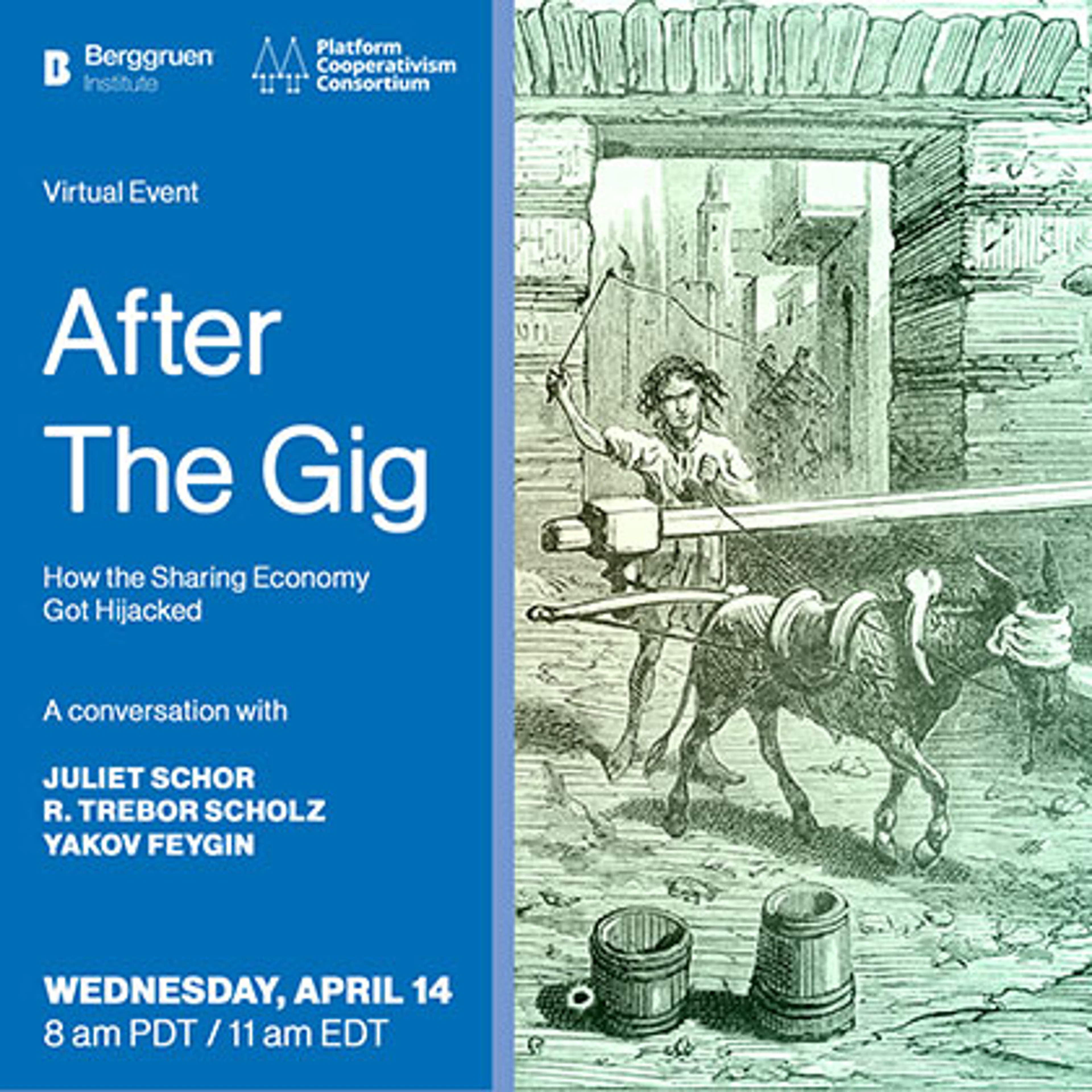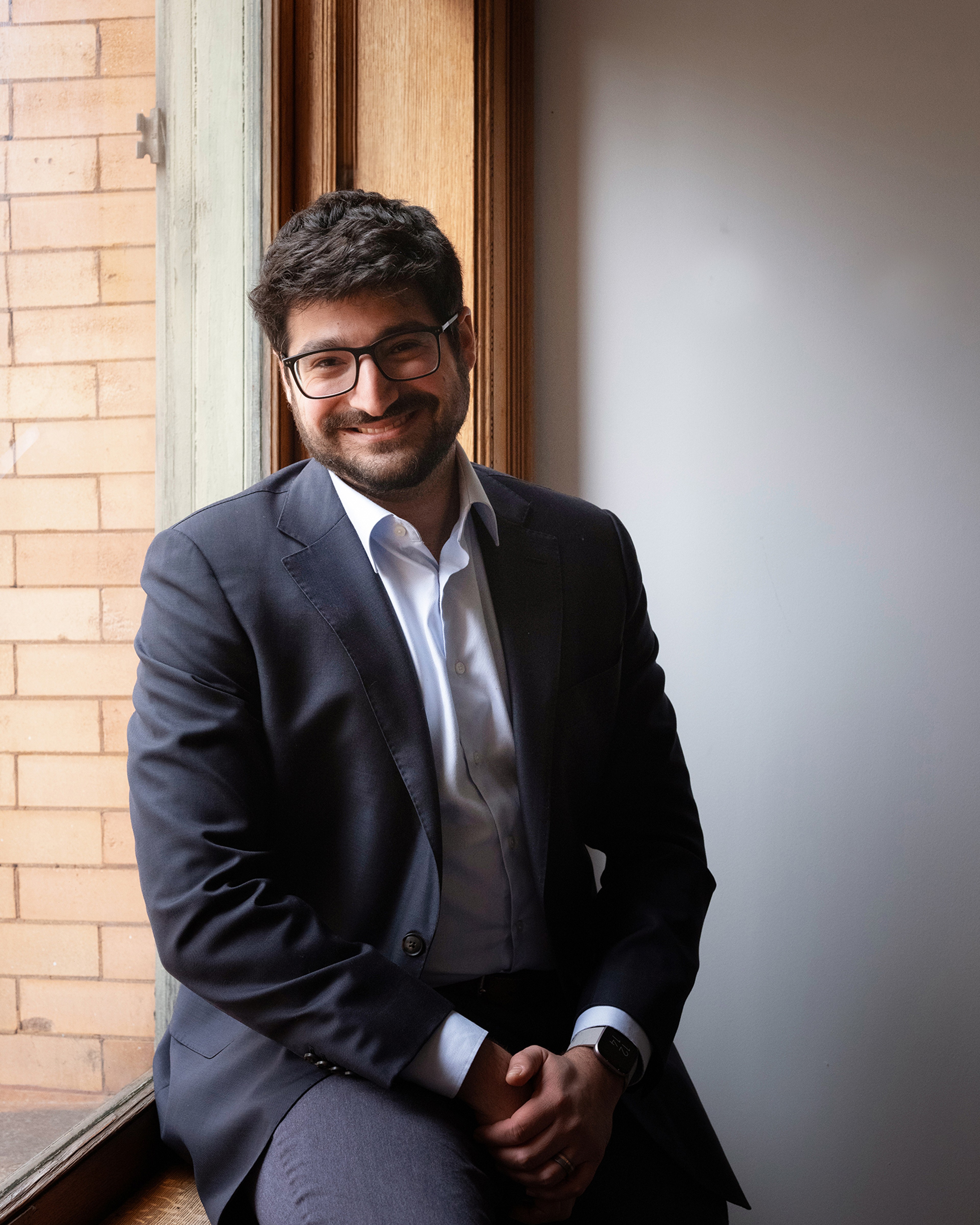After the Gig: How the Sharing Economy Got Hijacked
- Date: March 16, 2021
Date / Time:
Wednesday, April 14, 8:00 a.m. PDT | 11:00 a.m. EDT

About the Event:
The “sharing economy” was sold to us as a liberatory innovation that would unlock horizontal relationships between citizens as both producer and consumers. Now, over a decade later, its promises are unfulfilled. Instead, we have a “gig economy” that has created precarious jobs, contributed to falling wages, and has increased carbon footprints. Recapturing the initial potential of a genuine “sharing economy” requires a reinvention of the structures underlying not only the “tech platforms” but capitalism itself. The Berggruen Institute and the Platform Cooperativism Consortium bring together Juliet Schor (Boston College), author of After the Gig: How the Sharing Economy Got Hijacked in conversation with Trebor Scholz (The New School) and Yakov Feygin (Berggruen Institute) to discuss alternative visions for how the sharing economy can be organized and how we can get there.
About the Speakers:
Juliet Schor is Professor of Sociology at Boston College. Schor is also a member of the MacArthur Foundation Connected Learning Research Network. Schor’s research focuses on consumption, time use, and environmental sustainability. A graduate of Wesleyan University, Schor received her Ph.D. in economics at the University of Massachusetts. Before joining Boston College, she taught at Harvard University for 17 years, in the Department of Economics and the Committee on Degrees in Women’s Studies. Schor’s most recent books are Sustainable Lifestyles and the Quest for Plenitude: Case Studies of the New Economy (Yale University Press, 2014) which she co-edited with Craig Thompson, and True Wealth: How and Why Millions of Americans are Creating a Time-Rich, Ecologically Light, Small-Scale, High-Satisfaction Economy (2011 by The Penguin Press, previously published as Plenitude).
Trebor Scholz is a scholar-activist at The New School in New York City. His book Uber-Worked and Underpaid. How Workers Are Disrupting the Digital Economy (Polity, 2016) introduces the concept of “platform cooperativism” as a way of joining the co-op model with the digital economy. He has edited and co-edited volumes including Ours to Hack and to Own: Platform Cooperativism. A New Vision for the Future of Work and a Fairer Internet (listed by Wired Magazine as one of the Top Tech Books of 2017), and Digital Labor: The Internet as Playground and Factory (Routledge, 2013). His articles and ideas have appeared in The Financial Times, Le Monde, The New York Times, The Nation, and The Washington Post. He is the Founding Director of the Platform Cooperativism Consortium (PCC) and the Institute for the Cooperative Digital Economy (ICDE) at The New School, which are key hubs for the research and coordination of the cooperative digital economy. Scholz keynotes conferences and presents on the cooperative digital economy to audiences around the world. Dr. Scholz is a guest professor at Mondragon University, fellow at Open Society Foundations, and the Berkman Klein Center at Harvard University. At the Berggruen Institute, he will work on an activist guide to the future of the gig economy tentatively titled Own This! The book tracks and analyzes the global platform cooperativism movement through the lens of numerous case studies and worker interviews — focusing on what happens when you take the cooperative business model to the digital economy. Structured as a globetrotting tour—from the U.S., around the world, and back—meeting workers, activists, and scholars from all walks of life, encountering again and again not only the dehumanizing effects of the extractive economy, but also the dignity and unity, the vision and the principles, required to withstand and ultimately transform it.
Dr. Yakov Feygin is responsible for developing the research agenda, projects, initiatives and partnerships for the Future of Capitalism program at the Berggruen Institute. As a core part of the Berggruen Institute’s work to develop and promote long-term answers to the biggest challenges of the 21st Century, the Future of Capitalism program will work to identify new ideas, models and mechanisms about how to manage and legitimate market economies.
Prior to joining the Berggruen Institute, Yakov was a fellow in History and Policy at the Harvard University Kennedy School of Government and managing editor of The Private Debt Project. In these capacities, he conducted and coordinated research into international political economy, financialization, and comparative economics systems.
Feygin holds a Ph.D. in History with a focus on economic history from the University of Pennsylvania. His forthcoming book, Building a Ruin: The International and Domestic Politics of Economic Reform in the Soviet Union will be published by Harvard University Press. He has taught courses in international political economy, money and banking and business history and held fellowships from the Institute for New Economic Thinking, The Fulbright-Hays Doctoral Dissertation Research Abroad Program, Harvard University, and the University of Pennsylvania.

